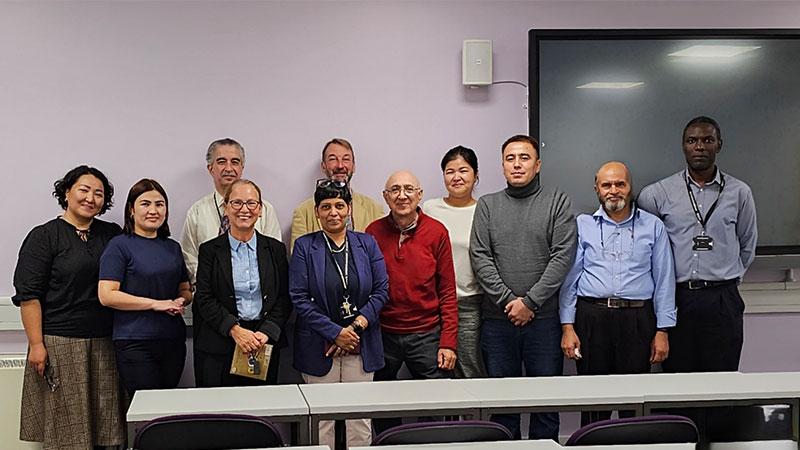Academics from Al-Farabi Kazakh National University, Almaty, and Asfendiyarov Kazakh National Medical University in Kazakhstan, have been awarded Bolashak Research Internship Scholarships to attend the Westminster Biotechnology Research Internship Scheme.

The Bolashak Scholarship Program is a prestigious scholarship initiative in Kazakhstan. Established in 1993, it was designed to support the education of Kazakhstani citizens abroad, particularly in countries with advanced educational systems. The programme is funded by the Kazakhstani government and is administered by the Centre for International Programs.
Its primary goal is to train highly qualified specialists, scientists and professionals in various fields, with the expectation that they will contribute significantly to the socio-economic and technological development of Kazakhstan. The scholarship covers a wide range of academic disciplines, including but not limited to Engineering, Natural Sciences, Social Sciences, Humanities, Medicine and Business.
The Westminster Biotechnology Research Internship Programme is a one-year scheme organised by members of the Sustainable Biotechnology Research Group and the Genome Engineering Laboratory of the School of Life Sciences. The programme includes classes, workshops and research projects around the themes of green innovation, bioengineering, genome engineering and investigation of human disease vulnerabilities.
Sustainable biotechnology is a rapidly growing area of science due to the emerging need for bio-products produced using sustainable renewable resources. Examples of bio-products include biofuels, biopolymers, biofertilisers, biopesticides, chemicals, biopharmaceuticals, nutraceuticals, food – including that produced via precision fermentation - and enzymatic detergents.
The Sustainable Biotechnology Research Group aims towards the exploitation of biological resources for the production and development of a range of bio-products and their use for environmental, medical and chemical/biochemical applications. The Group’s strapline is: “Tackling global challenges in water, energy and food security, environmental protection and sustainable industrial production using biotechnology”.
The Genome Engineering Laboratory aims to nurture researchers with the essential knowledge required to investigate the molecular basis of human diseases, harnessing the power of the Nobel prize-winning gene editing technology, CRISPR. This technology presents a multitude of multidisciplinary applications, ranging from enhancing understanding of infectious and non-infectious diseases and advancing drug discovery to improving crop yields, combating mosquito-borne illnesses and potentially terraforming Mars in the future. Through proactive approaches in research-engaged education, the lab has created extracurricular programs such as Gene Editors of the Future and Discover to Recover.
The research fellows are Dr Aknur Turgumbayeva, Dr Assem Kalykova, Dr Elmira Kartbayeva, Dr Gulnaz Seitimova, Dr Gulzila Vassilina and Dr Serzhan Mombekov.
Commenting on the internships, Dr Godfrey Kyazze, Reader in Bioprocess Technology, co-leader of the Sustainable Biotechnology Research Group and co-organiser of the internship scheme, said: “I am very excited to be hosting the researchers, and I am looking forward to having fruitful discussions with them. The researchers will contribute to our quest for pushing the boundaries of science while meeting our knowledge exchange and globalisation plans."
On her part, Dr Kalpana Surendranath, Senior Lecturer in Molecular Biology, co-organiser of the internship scheme and co-leader of the Genome Engineering Laboratory, said: "In alignment with the knowledge exchange objectives outlined in the Westminster Strategy 2022-2029, this program facilitates interdisciplinary thinking and exchange of methodologies and perspectives among academic scholars, strengthening our research community while also nurturing a culture of inclusivity in research and higher education."
Professor Brendon Noble, Head of the School of Life Sciences, added: “I am delighted to host this group of esteemed research academics from Kazakhstan. They will work with my colleagues in the School of Life Sciences, and I know that these collaborations will produce impactful and innovative research findings. I welcome them all to the School.”
Find out more about the School of Life Sciences.


